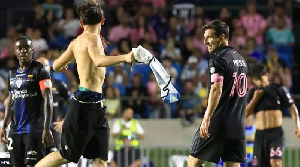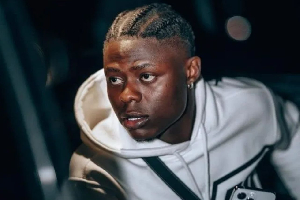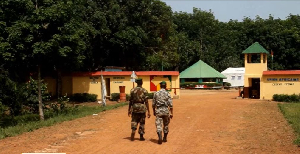President John Kufuor on Tuesday said the government was resolved to restore order to the country for the people to live within the tenets of the Constitution.
He said this required law and order, which should be well organised and maintained with an efficient and effective Police Service.
President Kufuor said this during his maiden visit to the Ghana Police Service Headquarters during which he addressed officers and men drawn from all parts of the country after inaugurating the 10-member Police Council.
He said the country was in crisis with regard to the maintenance of law and order because the Police Service, the most vital agency of state to carry this out, had over the years witnessed a decline in its image.
President Kufuor said with the establishment of the Police Council, the government was hopeful it would work with the police personnel to improve on its image to become a solid, reliable and dependable service that would be able to maintain law and order.
He said the image of the police declined because of the long period of the revolution when there was proliferation of para-military agencies and the police was neglected.
President Kufuor said their recruitment training, promotion, equipment, logistics support and other conditions of service to motivate them fell prey to the politicisation with establishment of the Association of Committees for the Defence of the Revolution (ACDR).
He said as a result of the infiltration and neglect of the police, it lost its job pride, which was replaced with favouritism and endemic corruption that combined to reduce the efficiency of the police.
President Kufuor said now that the country had democracy entrenched in power, government was resolved to live under the rule of law and the police must be given the needed assistance to become an effective arm of government to maintain law and order.
"The people want to see the police as its first wall of defence when they are in trouble, must feel assured that they could take refugee in them when they are faced with danger then your uniform should be a relief to the people."
President Kufuor told the police that to offer the people this assurance, they must work around the clock to exorcise the image which the police had plunged itself into.
He said they should show commitment to their duty and be seen as a disciplined service which respected authority and other due processes of the law whereby personnel within their ranks who fell foul to the law were punished since the law was not a respecter of persons.
President Kufuor urged them to work fearlessly to assure the people that they would protect society, saying government was resolved to remove any politicisation from the police to exert professionalism in their duties to protect life and property.
He said government was aware of their conditions of service, poor remuneration, poor accommodation facilities, obsolete equipment in the present Information Technology (IT) and computer age.
The president said their work was a missionary one since they were working not because of the comfort they would enjoy but they were imbued with a sense of justice and to safeguard society.
President Kufuor asked them to use their initiative to work with the limited resources at their disposal under the circumstances while government was working hard to improve on the conditions in order that their sacrifices would not be in vain.
He said the current spate of armed robbery and activities of all types of gangsters should be nipped in the bud. "You must be effective without being unlawful, anybody who seeks to offend you, you must resist him with any reasonable force and government will support you."
President Kufuor said government's White Paper on the May 9 Accra Sports Stadium Disaster was to ensure justice was done to those who lost their lives and not to victimise any police personnel at the stadium although command at the stadium on that day came down so low.
"Some police officers were affected, the situation should not be approached in terms of any unionism; you are there for all the citizens. Some police personnel exceeded their power and the law must take its course. People should be made to account for their misdeeds."
Mr Ernest Owusu-Poku, Inspector of Police (IGP) said the police service had the ability to perform the statutory functions to maintain law and order efficiently and effectively.
However, the constraints under which they operated were enormous and sometimes daunting. Some of the constraints are their numerical strength, training, transport, communication and information technology equipment, inadequate budgetary allocations and other indispensable materials that make for effective policing.
He said equipment for the present 16,000 police personnel including professionals such as doctors, nurses and others engaged only in duties involving their specialised areas for the 18 million Ghanaians was woefully inadequate.
The IGP said there was the need to recruit more hands but this was limited by lack of accommodation adding that their present accommodation could cater for not more than one-third of their manpower population.
"Consequently, the administration has been compelled over the years to rent private houses throughout the country which cost the police about five billion cedis annually."
Mr Owusu-Poku said their transportation situation was not encouraging while their communication system throughout the country had virtually broken down.
He said existing gadgets were obsolete; most police stations were without communication equipment and where telephone facilities were available they often did not function due to disconnection arising out of huge unpaid bills.
He said due to budgetary constraints they could not organise refresher courses for the personnel, adding that this year, however, they had managed to train 735 new recruits and organise some refresher courses.
The IGP expressed concern about the spate of attacks on police stations, saying these were setbacks in their resolve to provide quality service for the people.
He called for the cultivation and nurture of a healthy relationship between the police and the people through the community policing concept.
General News of Wednesday, 28 November 2001
Source: .












